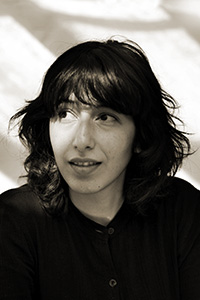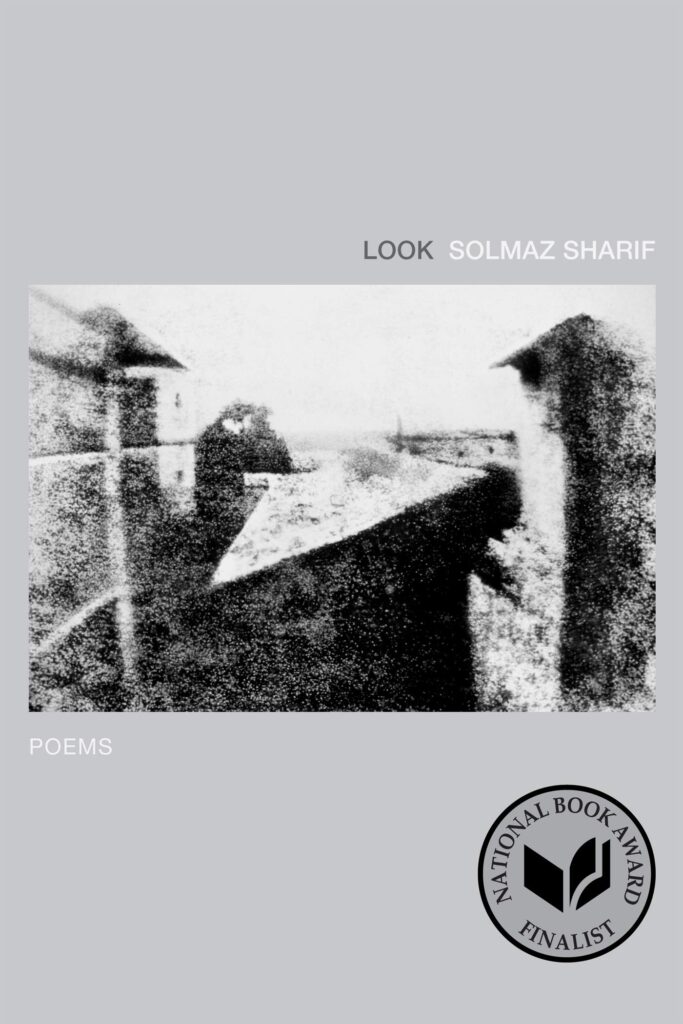
Solmaz Sharif is an Iranian American poet and essayist. Her academic pedigree includes degrees from University of California Berkeley and New York University. She is currently an assistant professor at Arizona State University. Her poetry collection Look was published in 2016. Her previously published poetry is featured in Look and is expanded upon within the collection. Look has received consistent positive feedback and is largely seen as innovation in the world of contemporary poetry and a welcomed exploration of perspectives that are not often seen in popular western media. Themes that fight against the marginalization and cliché-based reduction of Iranian and other middle eastern people are prevalent and pronounced in Look.

Statements by Sharif:
Sharif on poetic and literary clichés:
“Clichéd, bad writing often means clichéd, bad politics, and vice versa. Aesthetics and politics have a really vital and exciting give-and-take between them. It’s exciting for me to think of poets that are allowing their politics to also be shaped by these aesthetic considerations and wondering when the poetic will lead you to the kind of political surprise that a dogmatic approach wouldn’t allow. These are the artists that live on the fringes of what is aesthetically and politically accepted.” – 2015
Sharif on marginalized Iranian stories:
“The dominant narrative of Iranian exile or displacement in the U.S. is one that’s about people who were supporters of the Shah, who was a dictator, and were forced to leave after the Shah was overthrown by the Islamic Revolution. That’s not the only narrative, though…. It’s been important for me to write down as many narratives as I can, other narratives around the Iranian Revolution and the Iranian presence in the U.S., and also the possibility for Iranians to build coalitions with other Third World groups, as Iranians did in the seventies and eighties.” – 2016
Sharif on Women’s Representation in Popular Media:
“Before I was even a poet, when I studied sociology, what I wanted to look at were media representations of women—Palestinian women in the New York Times, for example. How are women described by media, or by state-sponsored language, in warfare, and how is that representation used to justify state-sponsored violence? Women are often purposefully brought into descriptions of what war is—to justify the rescue of a nation, or to justify its decimation by showing its entire people as despicable or threatening, for example.” – 2016
Sharif on Her Use of the Dictionary of Military and Associated Terms in Look:
“I was re-defining the terms in the dictionary using these documentary moments from the wars in Iraq and Afghanistan. I found this re-defining, whatever my intention, was keeping the wars within the same closed system the U.S. tries to make us believe they exist in. Basically, I was talking about Iraq and Afghanistan using military language, and this military language would only interact with these lands and peoples if I continued like this. This was a serious ethical and political problem. It pissed me off.” – 2015
Sharif responding to claims that her writing is political:
“For me it’s always been obvious that these things are not divorced—the political and the personal. The lyric self is the political weapon I have as a poet. My subjectivity is maybe the most potent force I have in interacting politically on the page.” – 2017
“The political . . . is not, as its strictest definition supposes, something relegated to legislative halls, but something enacted wherever power is at hand, power being at hand wherever there is a relation, including the relation between text and reader.” – 2016
Awards:
Finalist for the National Book Award in Poetry
Fellowship from the Poetry Foundation
Fellowship from the National Endowment for the Arts
Fellowship from the Rona Jaffe Foundation.
Sharif has written essays for the following publications:
“The Near Transitive Properties of the Political and the Poetical: Erasure,” Evening Will Come
“A Poetry of Proximity,” Kenyon Review Online
Blogger, Kenyon Review Online
“Choosing to Behold: On the Cover of Look,” Graywolf Blog
Sharif’s poetry has been published in the following publications:
“America” in Harper’s
“Now What” at the Academy of American Poets
“The Master’s House” and “The End of Exile” at Poetry Magazine
“Beauty” at the Freeman’s Channel at Literary Hub
“Deception Story” and “Persistence of Vision: Televised Confession” at the Academy of American Poets
“[Persian Letters]” and “Lanat Abad/The Place of the Damned” at Poetry Magazine
“Social Skills Training” at BuzzFeed Reader
“Civilization Spurns the Leopard” and “Force Visibility” at Granta
“Exile Elegy” at Lit Hub
“Desired Appreciation” at Kenyon Review
“Vulnerability Study” at Poetry Magazine
“Perception Management: An Abridged List of Operations” at The New Republic
“Look at PEN America
“Safe House” at Boston Review
“lay” at DIAGRAM
“Reaching Guantanamo” at Paper Bag
“Suitcases” and “Theater” at PBS’s Tehran Bureau
“Special Events for Homeland Security” and “dear Intelligence Journal” at Sink Review
“Drone” at Witness
Praise for Sharif’s Work:
“This is what Sharif’s poems do best: they get the reader to look at all sides of the war in its entirety, see what it is doing to the victims and the perpetrators, see the vulnerabilities, but also the strengths in the victims and perpetrators of war.” – 30 North
“Sharif suggests that humanity sometimes selects people to be not human. The stray child, the stray dog. The body on fire, nameless. The woman, not a woman but a nightgown. A nightgown to be targeted, and readers sense immediately that Sharif knows the many vulnerabilities of a woman dressed for bed peered at through a window.” – Kenyon Review
“With undeniable force, Sharif’s unadorned writing crosshatches militaristic language with recorded and lived experience, and the poems serve as both a proving ground and reckoning. In poems like “PERSONAL EFFECTS,” her avowal is clear: “Daily I sit / with the language / they’ve made // of our language,” and so the reader (as a reader reading) is immediately complicit, confronted. As the collection’s title suggests, look refuses to turn away, refuses to gloss over historical or personal fact, and crucially denies readers the privilege of looking away too.” – Blackbird Archive
“Look has been published just when it is most needed. Grief and wariness permeate the book and make these difficult poems to read, but the work they do is utterly necessary. ” – Harvard Review Online
“This polarity follows Sharif’s verse as it gestures at something she calls “our sanctioned twoness,” the conscious state of bearing two states of being at once. Here, the poet is political, here she is personal. She writes as citizen, as sister, as niece, daughter, or lover. Because the reality of one state is contingent on the other, Sharif’s doubling is a function — or more accurately, a consequence — of war’s impact.” – NPR